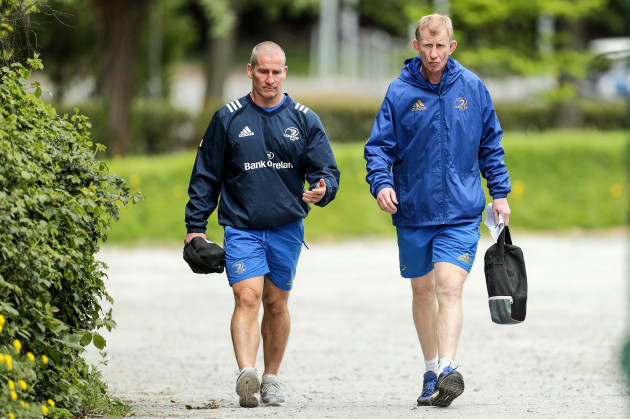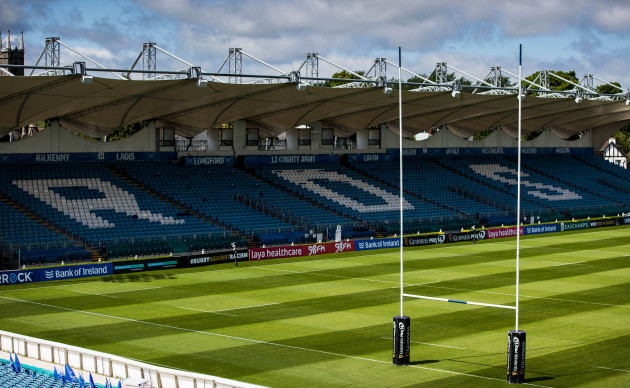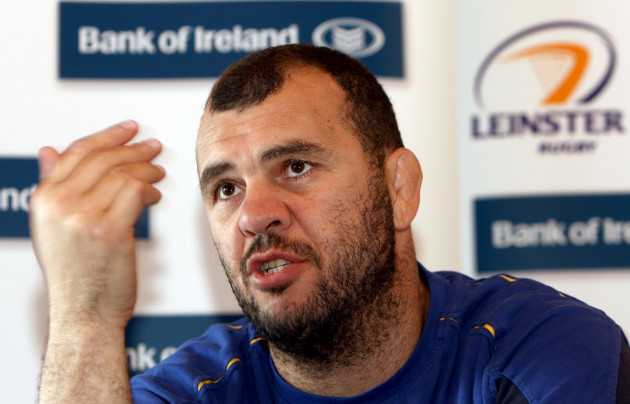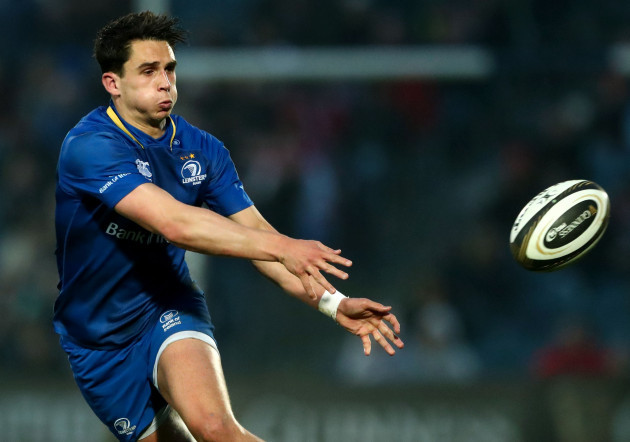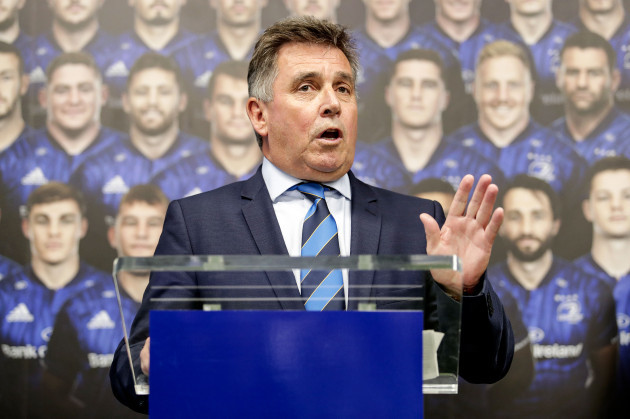THE MAN HOLDING the door is celebrating his anniversary. It is 20 years now since he first sat in this office, holding a balance sheet in one hand, a team sheet in the other.
Joe Schmidt has been in this room, Michael Cheika too. Brian O’Driscoll, Johnny Sexton, Rocky Elsom, Matt Williams, they’ve all sat across from him. Memory is like the tide and he forgets some details. “Around €2 million, I think,” he says when asked what the Leinster turnover was in 2001, when he became the province’s CEO. These days it is nine times that.
Tuesday afternoon in Leinster’s headquarters. Papers are strewn across Mick Dawson’s desk. On the walls, history. A signed photograph of O’Driscoll, wearing Leinster blue and Ireland green. On another wall, there’s a painting. Tellingly there isn’t a sign bearing his name or picture of him posing with a trophy.
That’s the way he likes it. He isn’t one bit shy but is self-aware. Of O’Driscoll, who lives in the same neighbourhood, he says: “I see Brian around a bit, he’s a good fella. But like, there’s a big age difference; it is not as if we are out drinking pints together or anything like that.”
- See sport differently with The42 Membership and get closer to the stories that matter with exclusive analysis, insight and debate. Click here to find out more>
In the history of Leinster Rugby, O’Driscoll’s name looms large, Sexton’s even larger. Then there are the game-changing coaches, Cheika, who guided the club to its first Heineken Cup, Schmidt who won another two, Leo Cullen and Stuart Lancaster, the odd couple who steered them to their fourth.
You think of all their great players, Nacewa, O’Brien, Furlong, Kearney, D’Arcy, Hickie, Healy, Horgan, Heaslip, and the thread of the Leinster story knits together. But there’s another name you may not have heard of. In every great club, there’s always an important person sitting in a back office.
At Leinster, that’s Dawson. “When I arrived all those years ago (November 2001), we were in portakabins with no computers and no access to email,” Dawson says. “The pitch (at Donnybrook), you could play cricket on it in August but by the middle of January, you’d break your ankle standing on it. There’s two brilliant all-weather pitches there now; a new stand.
“But if we wanted to really kick on, to grow (as a club) we had to move.”
That didn’t happen without a fuss. “Donnybook is our spiritual home,” committee men told him. In contrast, the RDS was home to the Dublin Horse Show. This was 2006, the future presenting itself to Dawson with a piercing clarity. “We could fit 6,500 into Donnybrook, mostly people standing; in the RDS, we could get 18,500 seated. The sums added up.”
Only a mile separated their old stadium from their new one yet the distance from old school values to the modern era was seismic. To bridge that gap, Dawson realised, they needed the right coach to navigate the way.
***
It’s easy to forget now how bad Leinster had been. Until Cheika came along, the honours board in their Donnybrook offices/portakabin consisted of one engraving: Celtic League winners, 2001/02.
“We’d had a rough time of it,” Dawson says. “Matt (Williams) was very good for us but Matt left for Scotland. So, Gary Ella came in; Gary struggled with the discipline; he was followed by Declan (Kidney) and that didn’t last long; so the next guy was to be our fourth coach in four years. That one had to work.”
You’d imagine they’d have taken the safe bet. Instead they went for a relative unknown, with Alan Gaffney, Williams’ former backs coach, recommending this fiery young man from Australia. “I met Michael Cheika in London,” Dawson said. “He was very authoritative, a good interviewee.
“And he was driven. Michael changed the mindset of the players, clearing out a few guys who he felt were just there for the ride. He brought an edge.”
You can’t argue with that. One year, midway through his second season, Leinster lost away to Glasgow. Cheika was miffed, properly pissed off. “He had a bit of trouble with referees prior to then,” Dawson recalls, “and wasn’t meant to go near them after games.”
On this night, following a Leinster defeat, he was yards away from the referee’s dressing room when Dawson suggested an alternate destination. Cheika stormed off. “He lost it, you know. I can’t remember his exact words (to me) but it was something along the lines of ‘you can do what you effing well like’.”
There is significance to this story. When Cheika was telling his boss where to get off, his CV didn’t stretch to a second page. He had yet to win anything, even a Magners League. The inaugural Heineken Cup win was still two years away, the Super Rugby title, Rugby Championship and World Cup final all to be achieved in the following decade.
In other words, had Dawson really wanted, he could easily have sacked the Australian without fear of recrimination. “Okay, so I could have stood up and said, ‘I’m the big boy here, I’m the CEO, no one should speak to me like that’. But what was I going to prove? Who wins then? Maybe my ego is sated but who is going to coach the team if you get rid of someone as good as Michael? The truth is people say things in the heat of the moment. You can’t get too upset about it.
“So yeah, we had a couple of blow-ups but the great thing about dealing with Michael was that the following day, you just moved on. Be in no doubt, Cheika was the right man for this place.”
So was his successor: a little known New Zealander called Josef Schmidt.
“Michael told us a year out that he was leaving. So we spoke to the players. We didn’t ask them who they wanted but what they wanted?”
Their answer was to the point. “Definitely not a has-been,” they said. It had to be someone young, energetic. “With that, we had the profile of the person. All we needed then was to look around.”
Their eyes were drawn to Clermont, where Schmidt’s work as a backs coach was favourably received, Leinster’s Isa Nacewa providing a glowing reference. What’s half-forgotten, however, is that Schmidt initially turned Leinster down, Dawson persuading him to travel across to Dublin with his wife, Kelly, to reconsider. Think of the hand he played then, arranging for Schmidt to speak with O’Driscoll, Leo Cullen and Johnny Sexton, the icon, the captain, the future star.
Imagine where Irish rugby would be now if he hadn’t.
Think too of how he held his nerve when Schmidt lost three of his opening four games, including one match in Treviso which led to a newspaper column where George Hook suggested the New Zealander had lost the dressing room.
“We were never worried at that stage, or at any stage, because we knew Joe was very good, a perfectionist,” Dawson says. “He was a bit of a control freak, was demanding but good coaches are like that. They want things done a certain way, very often their way. That’s part of the job here. The easiest fellas I ever dealt with were Matt O’Connor and Gary Ella but unfortunately neither of them worked out.”
**
Sports administrators are like referees. If you don’t notice them, it means they’re doing something right.
Dawson was 48-years-old when he said goodbye to his old life, a sales gig at Davy’s Stockbrokers, landing into the leaky portakabin in Donnybrook without a clear idea of what needed to be done. Up until then, Leinster were the enemy. “I’d been a Lansdowne man since school,” he says, recalling his days as a player, captain, then coach, finally a committee man at the club located on the Aviva Stadium’s doorstep.
“In the ‘90s, Leinster really only played Heineken Cup; so our attitude was, ‘right, the quicker you get them knocked out of Europe, the better, because we’ll get our players back’. Then you come in here and you see things from a completely different perspective. Someone said, ‘look, we’re paying the players, so we get them, not the clubs’.”
He began to view the world through blue tinted glasses. Did the IRFU – stealers of Leinster’s players in November and spring – become pantomime bad guys?
He actually gets on well with Philip Browne, the Union’s chief executive, going so far as to describe the IRFU as Leinster’s anchor. “We have a good relationship with them.”
Really? “Yes, really.”
Mmmmm.
“Now and again there are tensions but that’s natural.” Like the summer when Joey Carbery moved to Munster and Jordi Murphy to Ulster? “Look, Joey made that decision himself; whether he was influenced or not, I don’t know. Jordi was unlucky with injury. Honestly, we don’t mind player migration. What we don’t like is player manipulation, moving players around the place. We want to keep the best we produce here.
“Obviously different people have a different view. If, for example, you had the three best out-halves in the country then they may want to spread those around. But our aim in life is to be as competitive as we can in every competition we go into and you need a deep squad to do that.”
**
Twenty years. Say it slowly and it’ll sound like a prison sentence rather than a job. He has enjoyed it, the wheeling and dealing, the planning, drawing up a big picture. Contract negotiations, playing it cool with young fellas trying to make a living, that was the part he disliked.
For the most part, it has been fun, like the weeks when a new signing, David Holwell, ended up staying in his spare room until he found a gaff of his own. There was the time he rang up Denis O’Brien to persuade him to dig into his pocket to sign Johnny Sexton back from Racing.
He recalls the panic when they first moved to the RDS and were waiting on mobile floodlights to arrive from the UK. “We had a match at 7.30, in darkest winter. Around 3pm we rang the company. ‘Eh, where are you, lads?’
They’d loaded the mobile lights onto a container at Fishguard and had encountered a delay on their trip across to Rosslare.
“A town called Enniscorthy,” they told him.
“You’re kidding! Get a move on, would you?”
He was always in a hurry – with the stadium; the training facilities; the team. “When I came here in November 2001, I didn’t really understand what professionalism was all about,” he candidly admits. “Like, the players’ gym and dressing rooms were terrible. It was just very, very basic.”
They’d move, not just from Donnybrook to the RDS but also to UCD and their shiny new training complex, one that cost €2.5m, one that Dawson persuaded a former business colleague to fund.
For all this, he doesn’t want any credit. “I’d be a complete liar if I said it was down to me. These decisions, it’s never one person making them. There’s always at least a few people involved.”
It’s the same with the team. Cullen and Lancaster are an unconventional pairing, the untried rookie matching up with the jilted coach. But it’s worked, Dawson correcting you when he’s asked a question about Lancaster, quickly praising the Englishman’s contribution while reminding you Cullen is the head coach.
How many more years will he give to this? “I don’t know really,” he says in a way that suggests he knows fine well.
Until that day, he’ll stay in the shadows. “I’m happy there,” he says.
It’s better for everyone when administrators think that way.
See sport differently with The42 Membership and get closer to the stories that matter with exclusive analysis, insight and debate. Click here to find out more>


